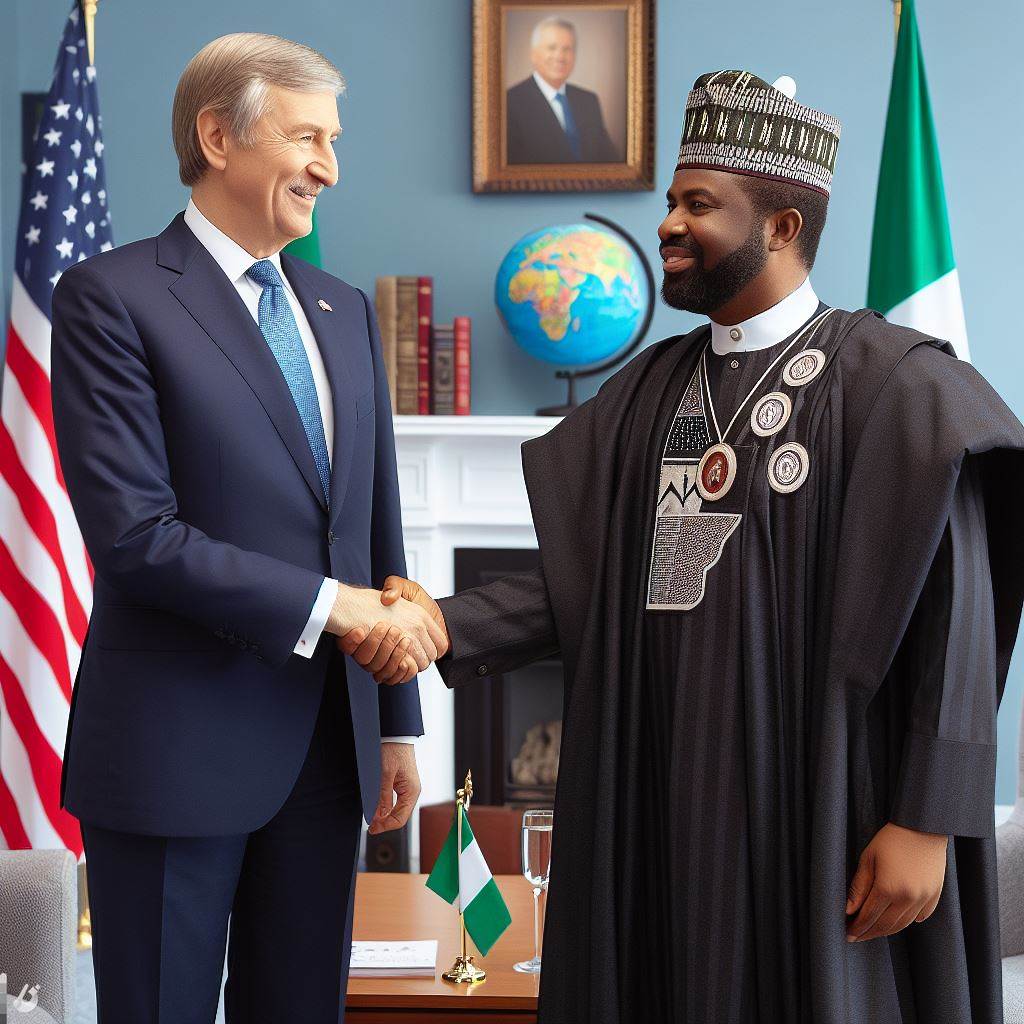Introduction
Diplomacy education holds immense significance in Nigeria, shaping its international relationships and foreign policy decisions.
Through this blog post, we will provide a brief overview of the history of diplomacy education in Nigeria.
Nigeria, as a country, realizes the importance of diplomacy education in contributing to its national development.
Diplomacy education equips individuals with the necessary skills to effectively represent Nigeria on the global stage.
The roots of diplomacy education in Nigeria can be traced back to the colonial era.
During this period, Nigeria mainly focused on training its diplomats through British institutions and frameworks.
After gaining independence in 1960, Nigeria started building its own educational institutions and frameworks for diplomacy education.
The establishment of the Ministry of Foreign Affairs in 1960 marked a significant milestone in the development of diplomacy education in Nigeria.
Nigeria recognized the need to train diplomats who could effectively represent the country’s interests.
Diplomacy education expanded during the subsequent decades, with the establishment of educational programs and institutions.
These institutions aimed to provide comprehensive training in diplomatic skills such as negotiation, communication, and international law.
Nigeria continues to prioritize diplomacy education, understanding its crucial role in maintaining peaceful international relations.
Diplomacy education empowers Nigerians to effectively engage in international diplomacy and contribute to Nigeria’s global standing.
In essence, the history of diplomacy education in Nigeria highlights its significance and evolution in molding Nigeria’s foreign policy decisions and international relationships.
Historical Background
Colonial era and the absence of formal diplomacy education
During the colonial era, Nigeria did not have any formal education in the field of diplomacy.
The British colonial government saw no necessity for such training, as they were primarily focused on maintaining control and exploitation of resources.
However, despite the absence of formal education, some Nigerian individuals and organizations recognized the importance of diplomacy and took initiatives to promote its education.
These visionaries understood that diplomacy was crucial for Nigeria’s progress, both domestically and internationally.
Early initiatives by Nigerian individuals and organizations to promote diplomacy education
One of the earliest initiatives was the establishment of the “Nigerian Association of Diplomats” in 1956.
This organization aimed to create awareness about diplomatic practices and provide a platform for learning among Nigerians interested in diplomatic affairs.
Another significant milestone was the creation of the “Nigeria Institute of Diplomacy and Foreign Affairs” (NIDFA) in 1979.
The NIDFA aimed to provide formal training in diplomacy, international relations, and foreign affairs.
It became an essential institution for aspiring diplomats.
Establishment of diplomatic training centers and institutes in Nigeria
In addition to NIDFA, other diplomatic training centers and institutes were also established across Nigeria.
These institutions played a vital role in providing education and training to individuals interested in diplomatic careers.
One notable establishment was the “Foreign Service Academy” (FSA), established in 1981.
The FSA focused on training new recruits for the Nigerian Foreign Service, equipping them with the necessary skills and knowledge to represent Nigeria effectively on the international stage.
Another prominent institution is the “National Institute for International Affairs” (NIIA), founded in 1961.
The NIIA offers research, education, and training in various aspects of international relations, diplomacy, and foreign policy.
Furthermore, Nigerian universities began incorporating diplomacy and international relations programs into their curriculum.
These academic programs provided a comprehensive understanding of diplomacy and prepared students for various roles in the field.
This historical background illustrates Nigeria’s journey in establishing formal diplomacy education.
From a period of colonial neglect to the proactive efforts of Nigerian individuals and organizations, the country has made significant strides in recognizing the importance of diplomacy.
The establishment of diplomatic training centers and institutes, alongside university programs, has shaped Nigeria’s diplomatic landscape and prepared individuals for successful careers in diplomacy.
Read: Graduate Stories: Successes in Nigerian Tourism Industry
Pioneers of Diplomacy Education in Nigeria
Profiles of notable Nigerian diplomats who played a role in promoting diplomacy education
Jaja Wachuku
Jaja Wachuku was one of the pioneers of diplomacy education in Nigeria.
He served as Nigeria’s first Minister of Foreign Affairs and played a crucial role in establishing diplomatic ties with other nations.
Wachuku was instrumental in promoting diplomacy education in Nigeria by advocating for the inclusion of diplomatic studies in the nation’s educational curriculum.
Oluyemi Adeniji
Oluyemi Adeniji, a career diplomat, served as Nigeria’s Minister of Foreign Affairs from 1999 to 2003.
Adeniji played a significant role in the development of diplomacy education in Nigeria.
Transform Your Career with Expert Guidance
Get personalized mentorship consulting that’s tailored to your unique path. Our expert advice is actionable and exclusive.
Get StartedHe initiated and supported various programs aimed at enhancing diplomatic skills and knowledge among Nigerian diplomats.
Adeniji’s efforts contributed to the professionalization of diplomatic training in the country.
Ibrahim Gambari
Ibrahim Gambari, a renowned Nigerian diplomat, served as Minister of External Affairs from 1984 to 1985.
Gambari’s tenure witnessed significant strides in diplomacy education in Nigeria.
He introduced reforms that emphasized the importance of diplomatic training and education.
Gambari’s contributions paved the way for the establishment of diplomatic academies and training institutes, which have since produced skilled diplomats for Nigeria.
Joy Ogwu
Joy Ogwu, the first female Nigerian Permanent Representative to the United Nations, played a vital role in promoting diplomacy education in Nigeria.
Ogwu’s career has been marked by her dedication to improving Nigeria’s diplomatic capabilities.
She advocated for the inclusion of diplomatic studies in Nigerian universities, leading to the establishment of programs focused on diplomacy and international relations.
Baba Gana Kingibe
Baba Gana Kingibe, a former Nigerian diplomat, made significant contributions to diplomacy education in Nigeria.
Kingibe’s career saw him hold various diplomatic positions in Nigeria, including serving as Nigeria’s Minister of Foreign Affairs.
Kingibe championed the need for specialized training for diplomats and played a crucial role in establishing the Nigerian Institute of International Affairs (NIIA).
The NIIA has become a center for excellence in diplomacy education, offering specialized training and research programs.
Their contributions to the development of diplomacy education in Nigeria
Curriculum Development
Pioneers of diplomacy education in Nigeria championed the inclusion of diplomatic studies in the national curriculum, ensuring that students receive formal education in diplomacy and international relations.
This move aimed to equip future diplomats with the necessary knowledge and skills to represent Nigeria effectively on the global stage.
Establishment of Diplomatic Training Institutes
These pioneers recognized the need for specialized training for diplomats.
They played a pivotal role in establishing diplomatic training institutes and academies, providing Nigerian diplomats with essential skills in negotiations, diplomacy, and protocol.
Advocacy for Diplomatic Studies
Notable Nigerian diplomats actively advocated for the inclusion of diplomatic studies in Nigerian universities.
Their efforts led to the establishment of dedicated programs and departments focused on diplomacy and international relations.
Professionalization of the Diplomatic Service
Through their dedication to diplomacy education, these pioneers worked towards professionalizing the Nigerian diplomatic service.
They emphasized the importance of ongoing training and development, ensuring that Nigerian diplomats are equipped with the skills and knowledge required to navigate the complexities of international relations.
Mentorship and Knowledge Sharing
Pioneers of diplomacy education in Nigeria actively mentored and shared their expertise with the younger generation of diplomats.
They recognized the importance of passing down their knowledge and experiences to groom the next generation of Nigerian diplomats.
In fact, the pioneers of diplomacy education in Nigeria have made significant contributions to the development of diplomacy education.
Their efforts have led to the inclusion of diplomatic studies in the national curriculum, the establishment of diplomatic training institutes, and the professionalization of the Nigerian diplomatic service.
Thanks to their contributions, Nigeria continues to produce skilled diplomats who effectively represent the country on the global stage.
Read: The Influence of Pan-Africanism on International Relations Studies in Nigeria
Evolution of Diplomacy Education in Nigeria
The history of diplomacy education in Nigeria has witnessed significant changes and developments in the curriculum of diplomacy education programs, an expansion of educational opportunities for aspiring diplomats, and collaborations with international diplomatic training institutions.
Changes and Developments in the Curriculum of Diplomacy Education Programs
Over the years, the curriculum of diplomacy education programs in Nigeria has undergone noticeable changes and developments.
In the early years, diplomacy education was primarily focused on theoretical knowledge and understanding of international relations and diplomatic practices.
However, with the evolving dynamics of the global diplomatic landscape, the curriculum has adapted to include a wider range of subjects and practical training.
Students now receive comprehensive instructions in areas such as negotiation skills, conflict resolution, intercultural communication, and international law.
Furthermore, the emergence of digital diplomacy has also influenced the curriculum.
Diplomacy education programs now incorporate modules on digital communication strategies and cybersecurity to equip future diplomats with the necessary skills for navigating the complexities of the digital age.
Expansion of Educational Opportunities for Aspiring Diplomats
Another significant development in the rise of diplomacy education in Nigeria is the expansion of educational opportunities for aspiring diplomats.
In the past, diplomatic training was limited to a select few who pursued degrees in political science or international relations.
However, recognizing the importance of specialized training for the field of diplomacy, universities and institutions have introduced dedicated programs in diplomacy and international relations.
This has opened up avenues for individuals from diverse academic backgrounds to pursue a career in diplomacy.
Additionally, the establishment of diplomatic academies has further expanded educational opportunities.
These academies provide specialized training and education for aspiring diplomats, offering programs that focus on practical skills, diplomatic protocol, and cultural sensitivity.
Collaborations with International Diplomatic Training Institutions
Nigeria has also fostered collaborations with international diplomatic training institutions to enhance the quality of diplomacy education.
These collaborations have allowed Nigerian diplomats and students to benefit from the expertise and experience of foreign institutions.
Through partnerships and exchange programs, Nigerian diplomats have been able to attend training courses and workshops conducted by renowned international diplomatic training institutions.
This exposure to different diplomatic practices and perspectives has enriched their understanding of diplomacy.
Furthermore, collaborations with foreign institutions have also facilitated the exchange of faculty members and diplomats, promoting cultural exchange and deepening diplomatic ties.
In short, the evolution of diplomacy education in Nigeria has been marked by changes and developments in the curriculum of diplomacy education programs, an expansion of educational opportunities for aspiring diplomats, and collaborations with international diplomatic training institutions.
These advancements have played a crucial role in preparing Nigerian diplomats for the complex challenges of the global diplomatic arena.
Read: Postgraduate Opportunities in Leisure & Tourism in Nigeria

Impact of Diplomacy Education
Benefits of diplomacy education for individuals and the nation
Diplomacy education equips individuals with essential skills such as negotiation, communication, and conflict resolution.
It helps individuals develop a global perspective and cultural sensitivity, enhancing their ability to engage with diverse cultures.
Diplomacy education fosters critical thinking and analytical skills, enabling individuals to analyze complex international issues.
It promotes a deep understanding of international relations and the dynamics of diplomacy, empowering individuals to navigate diplomatic challenges.
It enhances individuals’ diplomatic etiquette, diplomatic protocol knowledge, and understanding of international law.
For the nation
Diplomacy education contributes to the development of a competent diplomatic corps.
It enables the nation to effectively represent its interests and negotiate favorable outcomes in international fora.
Diplomacy education improves the nation’s reputation and standing in the international community.
It facilitates diplomatic dialogue and cooperation between Nigeria and other nations.
Diplomacy education strengthens national security by promoting peaceful resolution of conflicts.
How diplomacy education has contributed to Nigeria’s diplomatic endeavors
Diplomacy education has played a significant role in Nigeria’s foreign policy formulation and implementation.
It has equipped Nigerian diplomats with the skills and knowledge necessary to effectively represent the nation’s interests abroad.
Diplomacy education has facilitated Nigeria’s participation in international organizations and diplomatic engagements.
It has enhanced Nigeria’s diplomatic relations with other countries, fostering deeper mutual understanding and cooperation.
Diplomacy education has enabled Nigeria to actively contribute to global diplomatic efforts, such as peacekeeping missions.
Success stories and examples of Nigerian diplomats trained through diplomacy education
Ambassador Joy Ogwu, a Nigerian diplomat trained through diplomacy education, served as the Permanent Representative of Nigeria to the United Nations.
For Ambassador Ibrahim Gambari, who received diplomacy education, served as Nigeria’s Minister of Foreign Affairs and later became the Under-Secretary-General of the United Nations.
Ambassador Amina Mohammed, trained through diplomacy education, held various diplomatic positions and currently serves as the Deputy Secretary-General of the United Nations.
These Nigerian diplomats have exemplified excellence in diplomacy, effectively representing the nation’s interests on the international stage.
Their success stories highlight the positive impact of diplomacy education in nurturing skilled diplomats.
In general, diplomacy education has had a significant impact on individuals and Nigeria as a nation.
It equips individuals with essential skills, fosters a deep understanding of international relations, and enhances diplomatic etiquette.
For Nigeria, diplomacy education contributes to the development of a competent diplomatic corps, strengthens international relations, and promotes national security.
Success stories of Nigerian diplomats trained through diplomacy education further demonstrate its value and effectiveness.
Read: Studying Global Conflicts from a Nigerian Perspective: A Guide for IR Majors
Find Out More: Home Management for Nigerian Newlyweds
Challenges and Future Prospects
Challenges faced by diplomacy education in Nigeria
Nigeria has witnessed a rise in diplomacy education over the years, but this growth has not come without its fair share of challenges.
It is important to discuss these hurdles in order to find possible solutions and recommendations for improvement.
Lack of Funding
One major challenge facing diplomacy education in Nigeria is the inadequate funding from the government.
Limited financial resources make it difficult for institutions to provide quality education and training in the field of diplomacy.
Outdated Curriculum
Another challenge is the outdated curriculum used in Nigerian diplomacy education institutions.
The curriculum often fails to address current global issues and trends in international relations, which hinders students’ ability to keep up with the evolving nature of diplomacy.
Inadequate Infrastructure
Many diplomacy education institutions in Nigeria lack the necessary infrastructure to support effective teaching and learning.
Inadequate facilities, such as libraries and technology-equipped classrooms, limit students’ access to relevant resources and modern teaching methods.
Lack of Qualified Faculty
The shortage of qualified faculty members is also a significant challenge.
There is a scarcity of experienced diplomats and scholars who can effectively teach diplomacy courses and provide practical insights into the field.
Limited Research Opportunities
Diplomacy education in Nigeria suffers from limited research opportunities.
There is a lack of platforms and funding for students and faculty to engage in research that can contribute to the understanding and advancement of diplomacy.
Possible Solutions and Recommendations for Improvement
Increased Government Funding
To address the funding challenge, the Nigerian government should allocate more resources to diplomacy education.
Increased funding would enable institutions to improve infrastructure, attract qualified faculty, and update their curriculum to meet current demands.
Curriculum Review
Diplomacy education institutions should regularly review and update their curriculum to ensure it reflects the dynamic nature of the field.
This can be achieved through collaboration with practicing diplomats and international relations experts who can provide valuable input.
Improvement of Infrastructure
Investing in better infrastructure, such as well-equipped libraries and technology-enabled classrooms, will enhance the learning experience of students and facilitate effective teaching methods.
Faculty Development Programs
Institutions should prioritize faculty development programs to provide training and opportunities for diplomats and scholars to enhance their teaching skills and stay up-to-date with the latest developments in diplomacy.
Partnerships and Collaboration
Collaborating with international institutions and diplomatic organizations can provide Nigerian diplomacy education institutions with access to research opportunities, exchange programs, and funding, thereby enhancing the overall quality of education.
Outlook for the Future of Diplomacy Education in Nigeria
Despite the challenges, the future of diplomacy education in Nigeria looks promising.
As the country continues to play an important role in regional and global affairs, there is a growing recognition of the need for skilled diplomats and experts in international relations.
Efforts to address the challenges, such as increased government funding and curriculum review, will contribute to the improvement of diplomacy education in the country.
These measures will better equip students with the knowledge and skills required to navigate the complex and ever-changing world of diplomacy.
With continued investment in infrastructure, research opportunities, and faculty development programs, Nigerian diplomacy education institutions can produce competent diplomats who will effectively represent the country’s interests on the global stage.
In review, while challenges persist, the rise of diplomacy education in Nigeria presents a promising future.
By addressing the funding, curriculum, infrastructure, faculty, and research gaps, Nigeria can build a strong foundation for producing skilled diplomats who can contribute to peaceful international relations and the country’s overall development.
Conclusion
The rise and evolution of diplomacy education in Nigeria have been significant.
It has played a crucial role in shaping the nation’s foreign policy and improving international relations.
Diplomacy education has equipped Nigerian diplomats with the necessary skills and knowledge to effectively engage with other nations.
The importance of diplomacy education for the nation’s development cannot be overstated.
It has helped Nigeria establish diplomatic ties with other countries, attract foreign investments, and resolve conflicts peacefully.
Additionally, diplomacy education has contributed to the advancement of Nigeria’s national interests on the global stage.
To ensure the continued progress of diplomacy education, it is essential to support and promote it further.
Adequate funding and resources should be allocated to diplomatic academies and institutions.
Additionally, policymakers and stakeholders should prioritize the inclusion of diplomacy education in the curriculum at various levels of education.
Moreover, efforts should be made to strengthen research and collaboration among diplomatic academies, universities, and think tanks.
This will enhance the quality of diplomacy education and provide innovative solutions to complex global challenges.
Nigeria must recognize the significance of diplomacy education and its potential for national growth.
By continuing to invest in and promote diplomacy education, Nigeria can strengthen its position in the global arena and contribute to a peaceful and prosperous world.




